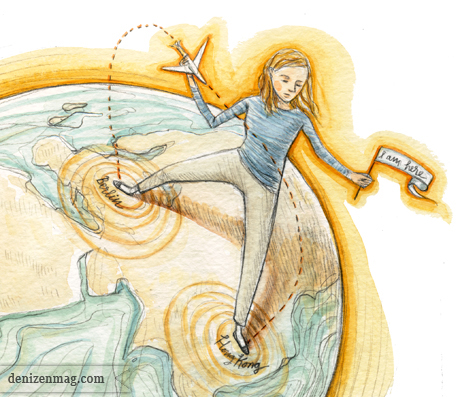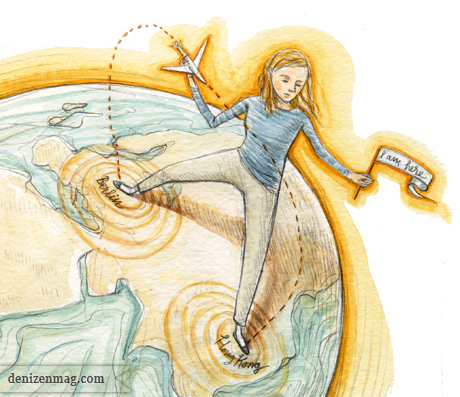Illustration for Denizen by Mary Lundquist
An hour after arriving in Hong Kong from Berlin, I am sitting inside a Malaysian restaurant within the gleaming IFC mall. Unlike American food courts, the cuisine particular to Asian malls is delectable, as my pork noodles with kai lan, chili, and ginger attest. Less appealingly, Muzak saxophones scream the Titanic theme song. I hear Mandarin all around me; each time I visit Hong Kong the “official” Chinese dialect seems more and more ubiquitous. I can no longer comprehend the conversations: my understanding is now limited to recognizing the sounds of the words, knowing only that I once knew what most of the sounds meant. This is true of their written form, too: I stare at billboards, and the Chinese characters are like friends from grade school, whose faces you recognize but whose names have long escaped you.
On the plane, a middle-aged Kiwi woman spent a good chunk of the eleven- hour ride chatting up the fresh-faced twenty-something Swiss backpacker next to me. She told him how she and her husband still milked their cows with their own hands. An hour later, she informed him, in a low voice, that—while she was not prejudiced—the problem with Maoris in New Zealand nowadays was that they were lazy, often alcoholic, and abused their children. The Swiss nodded solemnly.
It is a relief to be inside the mall after so many maddening hours mid-air. Wonderful to watch an overfed mainland family sit down and order, wonderful to watch two girfriends slurp tea and laksa, wonderful to have landed. I hesitate to speak Mandarin to the waiters, unsure if it will come out right, and of what speaking Mandarin in Hong Kong suggests. On the plane, I spoke only two sentences to the Swiss traveler next to me, after he asked where I was headed: I avoid inflight conversations the way most people avoid aggressive dogs or ranting lunatics.
I’ve landed, but where am I? In German, to arrive, “ankommen,” is understood to be a longer process, one that could take days or weeks. A common question for a traveler “Bist du gut angekommen?” or “Did you arrive well?” does not have a precise English equivalent, but I think it hints that arrival is not simply an indisputable fact, but rather a series of unfolding events, of readjustments and refittings, until the person has fully “arrived.” Given that I’m flying away again in four days, this is not likely to occur. One V.S. Naipaul novel has the beautiful title The Enigma of Arrival. The questions suggested by the phrase—When does arrival happen? When is it possible?—resonate with me now.
After devoting so much time as a kid to arriving (which also means a devotion to departure: to leaving, forgetting, dis-identifying with), I feel more wary than ever of arrival here. I have an increasingly stable life in Berlin, which did not come easily. In order to learn German, it seems, I had to forget Chinese. But what to do with the relief at seeing Hong Kong’s foggy hills from the plane window? The tender joy of pork noodle soup that tastes like it is supposed to, as opposed to the soy-sauce-in-hot-water excuse for Chinese soup in Berlin? My finicky insistence on a harbor view with the hotel staff, so I can watch the boats bobbing on the water, water I’ve stared at since I was twelve?
I do not speak to people in the airplane because I do not want to get involved. It’s just ten hours, guys, and it’s just not worth it: the polite questions, the comparing of cheese eating habits between cultures and unemployment rates between countries. Wikipedia it when you get home. I want to dissolve into a private universe of reading, bad lasagna eating, and indulgent chick flick movie watching. I want to feel, as close as possible, as though I am actually flying: free, unencumbered, unreachable.
But back on the ground, it’s nice to reconnect. Not just with people, but also with the person I was here, and with the thousand tiny details I’ve missed since I’ve left. It’s frightening and exhilarating to try to renegotiate it all. I suppose my take on Naipaul’s title would be Degrees of Arrival. As a TCK, it’s hard to put two feet down in one place, to offer up that commitment. Drifting is what we do best. But for these three days in Hong Kong, and for my upcoming journey back to Berlin, I would like to stop working so damn hard at arriving, and to let each place simply receive me, even if my body believes I belong to my last time zone.


Thank you for such a wonderfully written, incisive and moving piece on the experience of moving around. Living a transient lifestyle is on the one hand exhilarating, but at the same time a sad and somewhat solitary experience. With every new arrival there is also a departure, and with it a deep sense of loss… And yet despite all of this, as you put it, “Drifting is what we do best.” It just can’t be helped.
You have put into words what I have felt for years but was never articulate enough to express, that my love for being in airports and planes was linked to a need for feeling “as close as possible, as though I am actually flying: free, unencumbered, unreachable.”
Thank you once again for this beautiful text.
LikeLike
Beautiful piece. I echo Darren’s attachment to your description of being anonymous, free, and unreachable while flying. It’s so perfectly put. Thank you!
LikeLike
Well said. You articulated exactly what I have felt. Thank you!
LikeLike
Amazing. Read it over again as soon as I’d finished it.
LikeLike